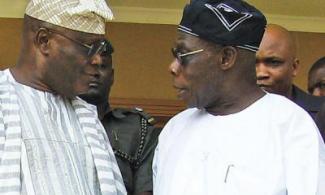
Former president, Olusegun Obasanjo and his deputy, Atiku Abubakar, may have influenced the sales of government enterprises to their friends, Mallam Nasir El Rufai, a former Director-General of the Bureau of Public Enterprises (BPE), has said.
Former president, Olusegun Obasanjo and his deputy, Atiku Abubakar, may have influenced the sales of government enterprises to their friends, Mallam Nasir El Rufai, a former Director-General of the Bureau of Public Enterprises (BPE), has said.
googletag.cmd.push(function() { googletag.display('content1'); });
Mallam El-Rufai made the revelations while testifying before an ad hoc Senate committee investigating the privatisation and commercialization of government businesses from 1999 till date.
Mallam El-Rufai told the committee that when he ran the Bureau, Obasanjo and Atiku contacted him at different times to influence the sale of government companies to their cronies but that he turned them down each time.
“The president and I were always quarrelling over issues of privatisation,” Mallam El-Rufai said. “Each time I told him we have a process ... that they should advise their friends to be the highest bidder.”
He added that former President Obasanjo blocked the sale of Nigeria Airways because of a personal interest he formed based on stories the then aviation minister, Kema Chikwe, was telling him.
Although Mallam El-Rufai hailed the idea of the privatisation programme, he blamed its failure after he left on government interference in the process. He said that under his leadership, the agency handled 33 transactions, closed 23 and that only one of the transactions he handled failed.
He further told the committee that the privatisation program saved Nigeria N265 billion annually. He said that between 1970 and 1999, Nigeria spent over $100 billion building companies but only got 0.5 percent of that amount back as return on investment.
He also said that Obasanjo ignored his recommendation of a successor and instead, appointed Julius Bala who was later investigated for fraud three months before the end of his stint at BPE. His described his successors as “cranky businessmen” who rather than being technically sound in privatisation issues, were only interested in making money.
Mallam El-Rufai’s claims are corroborated by testimonies of Chris Anyanwu, who was also a Director General of the bureau. Earlier, Mr. Anyanwu had told the Senate committee that “some individuals,” whom he described as “powerful,” influenced the decisions of both the bureau and the Infrastructure Concession Regulatory commission.
At an earlier hearing, Chief Obasanjo was also accused of having taking a unilateral decision—ignoring recommendations from BPE and due process—to sell Delta Steel Company to Global Infrastructure instead of the winner of the bidding process, BUA Group.
The Senate committee has since the beginning of the week been investigating the sale of over 100 government enterprises. It has taken testimonies from benefitting investors as well as both current and former heads of the bureau. It is however unclear if the committee will invite Obasanjo to testify before it.
googletag.cmd.push(function() { googletag.display('comments'); });
googletag.cmd.push(function() { googletag.display('content2'); });